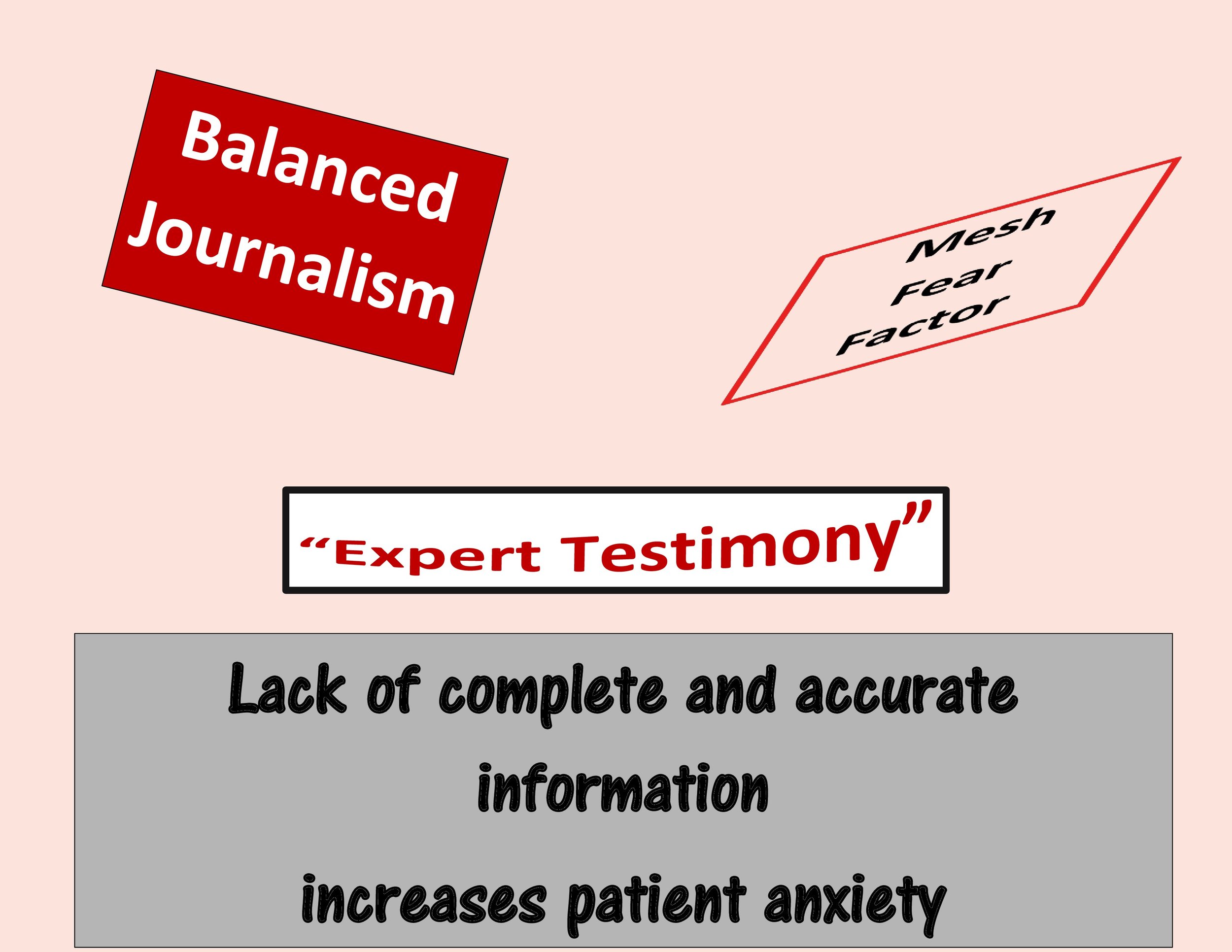Mother’s Day is a day we shine a light on the members of society that birth us, raise us, and nurture us. It is a day to cherish moms, giving back for all they have done and do for us daily.
Childbirth is the leading cause of pelvic organ prolapse (POP), a condition that impacts the lives millions of women around the world, with estimates indicating up to 50% prevalence. On this special day once a year, we should fill moms’ hearts with joy. The airing of a program like the mesh segment shared by 60 Minutes on Mother’s Day, Gynecological Mesh: The Medical Device that has 100,000 Women Suing, was unfortunate and inappropriate on this special day.
“There is a problem with how the medical devices are introduced into the market: The industry is motivated by financial returns. The physicians are motivated by delivering results efficiently. The patients are motivated by favorable outcome. The FDA is supposed to regulate this process. The whole process needs to be retooled to base the success of a medical device on patient outcome. That is the only thing that should matter.
In the current environment the medical devices follow a repetitive path upon introduction into the market. The devices are introduced into the market. Some succeed, some fail. The patients are harmed. Litigations ensue. It shouldn’t be like this. The patients’ outcome should be our number one priority and their voices should be heard loud and clear. Our goal should be a high reliability process which produces ZERO harm to our patients.”
S. Abbas Shobeiri, MD, MBA, Vice chair INOVA Gynecologic Subspecialties
Editor upcoming book on Vaginal Mesh Kits
Much has advanced in the POP arena over the past several years. Unfortunately, the media tends to focus on mesh complications, tipping the scales to bump up the Nielsen score card. When input provided by paid experts is sourced from one side of a medical issue alone and included in a print, radio, or television segment, there is potential to distort the message. The most appropriate news share includes experts on both sides of a medical concern to provide balance, enabling viewers to appropriately analyze options.
Life events waltzed me into the POP advocacy arena in 2009 when I published the 1st edition of my book Pelvic Organ Prolapse: The Silent Epidemic, following my POP surgical repair. I’ve had a front row seat throughout the bulk of the transvaginal mesh dialogue, and I’ve engaged in countless conversations within APOPS' patient support space. We guide women who prefer mesh surgery to optimize their chances of long term success. We guide women who prefer nonsurgical treatments. We guide women who will never consider mesh because their anxiety about complications is substantial. We guide women who’ve experienced mesh complications. We also communicate daily with the mostly silent majority, those women who have had mesh surgery, recaptured their quality of life, and have moved on rather than talk about it. As a woman who has past the 10th year anniversary of transvaginal mesh surgery, I am not exactly what you would call one of the silent majority.
I speak out about mesh on a regular basis because I believe in my heart that all women deserve the right to choice regarding POP treatment, and mesh has been validated to provide long term success.[1] Within our space we hear from women who have had 2, 3, or 4 surgeries to repair POP, and I find it horrific that any woman would have to suffer the pain, inconvenience, and expense of having their repair repeated. Women with POP experience impact to physical health, including high anxiety that the “bulge” is back. They experience impact to emotional ballast, including considerable anxiety that they may be “less than a woman”. They experience a reduction in social activity, related to anxiety that others will discover their bodies leak inappropriately. They experience impact to fitness, often refusing to give up running, despite knowing it is making their POP more pronounced. They experience impact to employment, including fear of having to disclose to employers the reason for surgery, why they can’t lift heavy or bulky items, why they have no choice but to run to the bathroom repetitively, or spend a half hour there attempting to have a bowel movement. And impact to intimacy is without a doubt, one of the most significant layers women stress about, often terrified their partners will see the bulge, not believe them if they express they are experiencing pain or will divorce them related to lack of companionship. APOPS encourages women to educate themselves about POP and explore all treatment options available. To exclude mesh when it is an option that typically results in long term alleviation of POP symptoms would be absurd.
“Isn’t it tragically sad…that women who put their life long pelvic health at risk by becoming moms and delivering into this world their own children, who now through evidence-based medicine finally have a durable, effective and safe treatment option for both stress incontinence and prolapse, are being misguided and alarmed on Mother’s Day…it is not only irresponsible, but immoral.”
Vincent Lucente, M.D., Institute for Pelvic Medicine and Reconstructive Surgery
Beyond having had one-on-one conversations with women who’ve experienced mesh complications, some of whom I’ve been communicating with since 2010, I also have family members who have had mesh complications, one immediately following surgery, and one for whom it has been on-going for years. One is likely related to inappropriate mesh use related to decades of prednisone use, the other more likely the result of inadequate skill-set. Those in the POP arena know it is imperative to find a Female Pelvic Medicine Reconstructive Surgeon (FPMRS) skilled in appropriate mesh use.
So, what are the details behind the Mother’s Day 60 Minute expose that were left out of the segment?
The following excerpt from Urogynecologic Surgical Mesh Implants by the Food and Drug Administration (FDA) dated September 19, 2017, clarifies their stance on the Boston Scientific product discussed in the Mother’s Day television expose:
“The FDA examined Boston Scientific’s supplier change in both contexts. During the course of our evaluation, the FDA conducted inspections of Boston Scientific and contract facilities involved in the manufacture of urogynecologic surgical mesh products. The FDA collected samples during the inspections and reviewed mechanical performance testing and sterility testing of the final mesh devices. The FDA also reviewed Medical Device reporting data and recall data and conducted a clinical assessment of Boston Scientific’s urogynecologic surgical mesh products. In addition, the FDA reviewed test reports regarding the chemical characterization of the polypropylene resin, and biocompatibility and mechanical performance testing on the final product.
The FDA determines the safety and effectiveness of finished products, not raw materials. However, in this case, to thoroughly address the allegations, we reviewed testing of the polypropylene raw material, as well as the finished mesh manufactured with polypropylene resin from both sources.
We found variability between the polypropylene resin from both suppliers, but determined, based on the information available to us, that these differences do not present new safety or effectiveness concerns, and do not require submission of a new premarket notification.”[2]
In response to the 60 Minute program, Boston Scientific indicated in a follow-up statement that the segment shared documents and photos taken out of context, and that medical societies and the healthcare community were not fully reflected.[3] It bears noting that the plastic expert’s sole activity is engaging in litigation related to plastics, which appear to be non-medical devices. Considering polypropylene-based devices have been a mainstay in a variety of medical procedures for more than 50 years, including hernia and tendon repair, pacemakers, absorbable and nonabsorbable sutures, knee, ankle, hip, and shoulder prosthesis, and heart valves, it stands to reason the use of polypropylene for treatment of pelvic organ prolapse is in good company.
A recent article that ran in the New York Times on April 14, 2018, “How Profiteers Lure Women into Often-Unneeded Surgery”,[4] clarified the seldom recognized or acknowledged inappropriate activity related to class-action litigation, including cold calling patients who had received mesh to frighten them into believing they required removal, or attorneys utilizing marketing firms to drum up clients. As a result, some women traveled out of state for procedures they did not require, taking place in less than appropriate surgical settings, and being provided by less than well-qualified surgeons. Post-surgery they were quickly released to return to their homes, without the safety of follow-up care. Some women indicated they didn’t know how the marketers found them and were familiar with their medical histories. It appears that their medical records and privacy were breached to enable law firms to access records.
Throughout these mesh media exposures, one refrain has been repetitive within APOPS' following. The voices of the women navigating pelvic organ prolapse want to know why media focus is always on mesh, rather than POP. I’ve wanted to know the answer to that question for the longest time as well, and will continue to chase media, hopeful the light will flicker within a hungry journalist experiencing POP, who recognizes the need to dig deeper. In the meantime, it is imperative we continue to move women’s pelvic health forward, despite the noise.
[1]De-Yi Luo, Tong-Xin Yang & Hong Shen, Long term Follow-up of Transvaginal Anatomical Implant of Mesh in Pelvic organ prolapse. Scientific Reports, volume 8, Article number: 2829 (2018) doi:10.1038/s41598-018-21090-w. https://www.nature.com/articles/s41598-018-21090-w Accessed 15 May 2018.
[2]United States Food and Drug Administration. Urogynecologic Surgical Mesh Implants. Released 19 September 19, 2017. https://www.fda.gov/MedicalDevices/ProductsandMedicalProcedures/ImplantsandProsthetics/UroGynSurgicalMesh/default.htm. Accessed May 14, 2018.
[3] Boston Scientific News Releases. Boston Scientific Perspective on “60 Minutes” Transvaginal Mesh Segment. Released 14 May 2018. http://news.bostonscientific.com/60minutes. Accessed 14 May 2018.
[4] Goldstein, M, Silver-Greenberg, J. How Profiteers Lure Women Into Often-Unneeded Surgery. Released April 2018. https://www.nytimes.com/2018/04/14/business/vaginal-mesh-surgery-lawsuits-financing.html. Accessed 14 May 2018.


